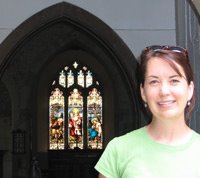14: Grace
I have not always believed in the grace of God. Actually, since I was roughly three, I’ve believed in the big, eternity-changing, salvation sort of grace. I prayed a prayer to ask Jesus in my heart—childlike and beautiful, I imagine—when I was three and we were all saying our evening prayers in my brother’s room. I remember kneeling on the shag carpet with our hands folded on his seventies comforter. I remember that he laughed. Actually, I don’t remember that anymore but I used to remember that and told myself that version of the story for so many years that now it’s fact, even if it didn’t actually happen. As a child in Baptist schools I prayed that prayer over and over, in chapel, at Vacation Bible School during the summer; everyone wanted to know in those days the date and time I prayed the “sinner’s prayer.” I was never entirely sure which one stuck.
Then in college I wondered if I really believed any of it—God, Jesus, the Bible, the need for salvation. I took two years to feel my way through doubt. I still knew, in some way that I’m not sure I can explain, that God was with me, that he was guiding me even as I asked questions and investigated what the rest of the world believed. I studied C.S. Lewis’s Mere Christianity and Surprised by Joy, and eventually determined that Christianity was true according to my experience, which was all I could use to judge it. I felt like it would take me a lifetime to evaluate all the logical, rational arguments and I didn’t have the brain power for that or the time and as much as I could evaluate them they felt true to me, so I came back. But I came back to a different faith. It was shaky and easily faltered and could be toppled over into a whirlwind of doubt by the little breath of a series of questions from my brother or a scientific article questioning the existence of Jesus or the occasional realization of the hugeness of the world that did not believe as I did.
But that is not the point here. I firmly believed in the love and grace of God. I knew that was one of Christianity’s distinctives. I could tell you how to confess your sins and be forgiven “of all unrighteousness”—even the things you didn’t know you did. But I didn’t actually believe in grace for myself, on a daily basis.
I’ve often felt like it’s impossible to keep up with my confession. I am simply too wrong, in my core. As soon as I confess and receive forgiveness and occasionally feel the depth of that, the cleanness of being right with God, I set off on another pattern of wrong thinking, where I am the center of my universe, where even when I try to put other people first and love God (and don’t always put that much energy into that), I fail miserably, and am aware of the fact that seemingly two seconds after I have been irrevocably washed clean I am dirty again, like filthy rags.
And years of church and faith – being instructed over and over to read my Bible every single day to please God, being taught implicitly that my spirituality was directly related to the number of services I attended, or the number of people I witnessed to, and being part of a family that doesn’t enjoy or maybe believe in laying about, in taking three hours by the pool with only a drink and a magazine (we are the industrious, entrepreneurial type)—I believed, I suppose, in the necessity of earning the pleasure of God.
I thrived on doing and forgot how to be. When I finally went to counseling to work through my depression, I was in a state in life where I couldn’t even make myself a cup of tea. I would watch my roommate make tea and wonder how she could take the time to do such a thing, to let the water boil, let the leaves sit, to actually slow down enough to drink it. Everything in my life was about doing. Every minute was scheduled to take advantage of my limited energy. So I worked until I crashed and couldn’t work any longer. And when I crashed, on my lost days, I could barely make or eat anything. I couldn’t even enjoy watching TV. The days would rush by as I laid on my couch with pictures going by on the screen in front of me, too numb and dissociated to be involved in the stories.
Everything was work. Work was my salvation. And not being able to work made me distraught.
It bothered me that I had forgotten how to relax. I wasn’t enjoying life. And perhaps part of me knew that I couldn’t save myself.



0 Comments:
Post a Comment
<< Home